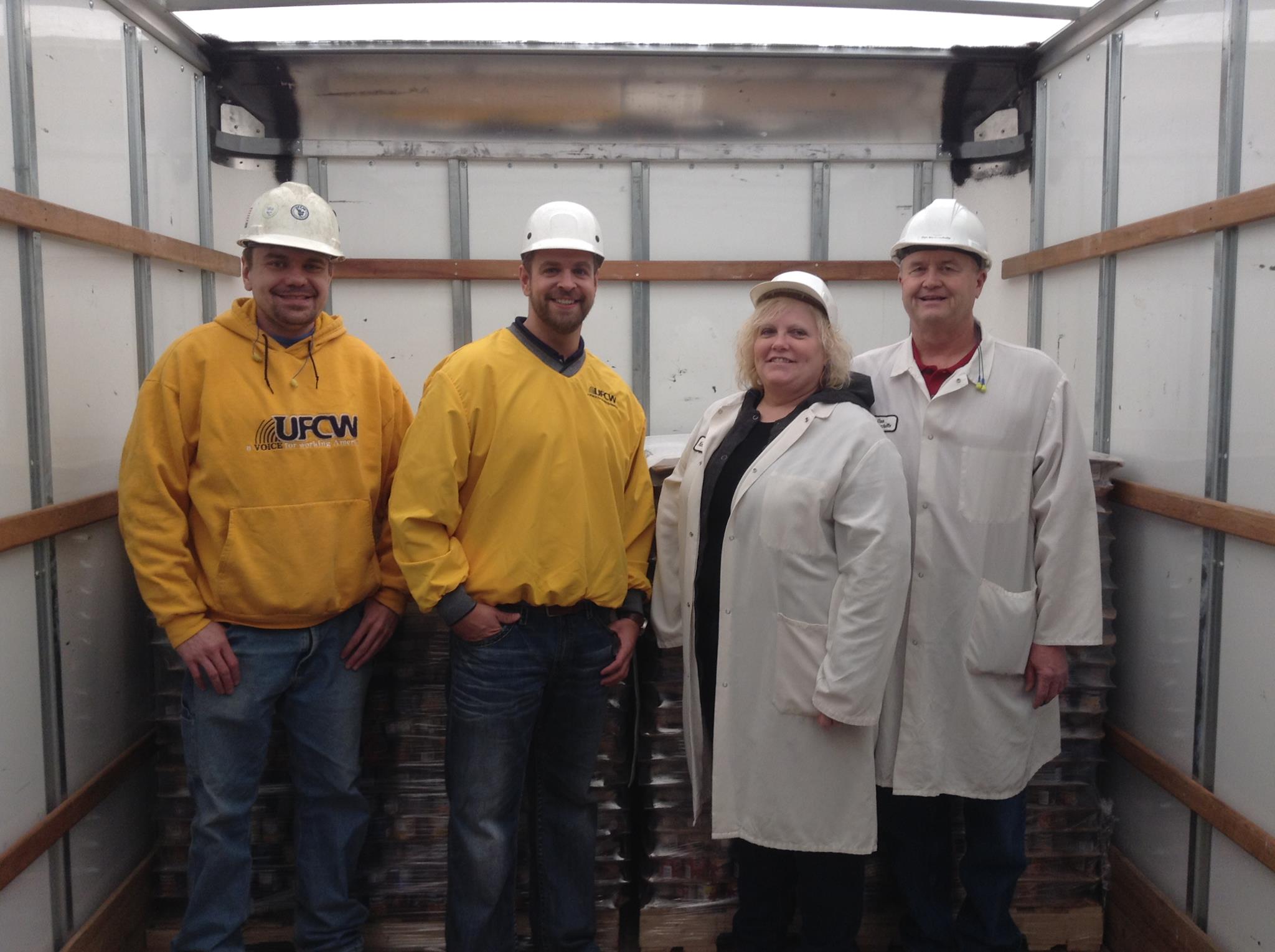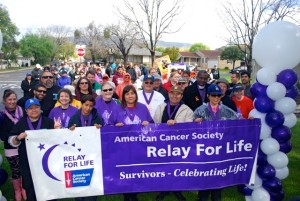May 26, 2016
Hillary Clinton Meets with Retail Workers at UFCW Conference
In sit down with Sec. Clinton, retail workers talk about organizing and their fight for fair work practices
(LAS VEGAS, NV) – Today, Secretary Hillary Clinton met with hard-working retail workers from across the industry to discuss the issues impacting them, their families, and co-workers. During the meeting, the workers talked about their day-to-day challenges, including workplace intimidation, scheduling and unpredictable hours. The emotional visit with Clinton included workers from Albertson’s, Macy’s, El Super and Stater Bros.
The meeting with Flora Castaneda and Yolanda Pivaral, both El Super workers, was especially powerful as they highlighted the company’s ongoing intimidation and failure to recognize their right to negotiate a better life and a contract providing better wages and benefits. They have both worked to organize their stores and join the UFCW.
Sherry Hamilton, who works as a union representative at Macy’s, discussed that while UFCW provides people with higher wages and protection, the non-union retail industry is still defined by unpredictable scheduling that makes it impossible to go to school, spend time with family, or have control over one’s life.
“I wanted Secretary Clinton to know how important joining a union was for me and my family. It’s the opportunity for a better life,” said Flora Castaneda, a UFCW member and worker at El Super. “I wanted her to know that companies like El Super need to do what is right and recognize our right to higher wages and benefits.”
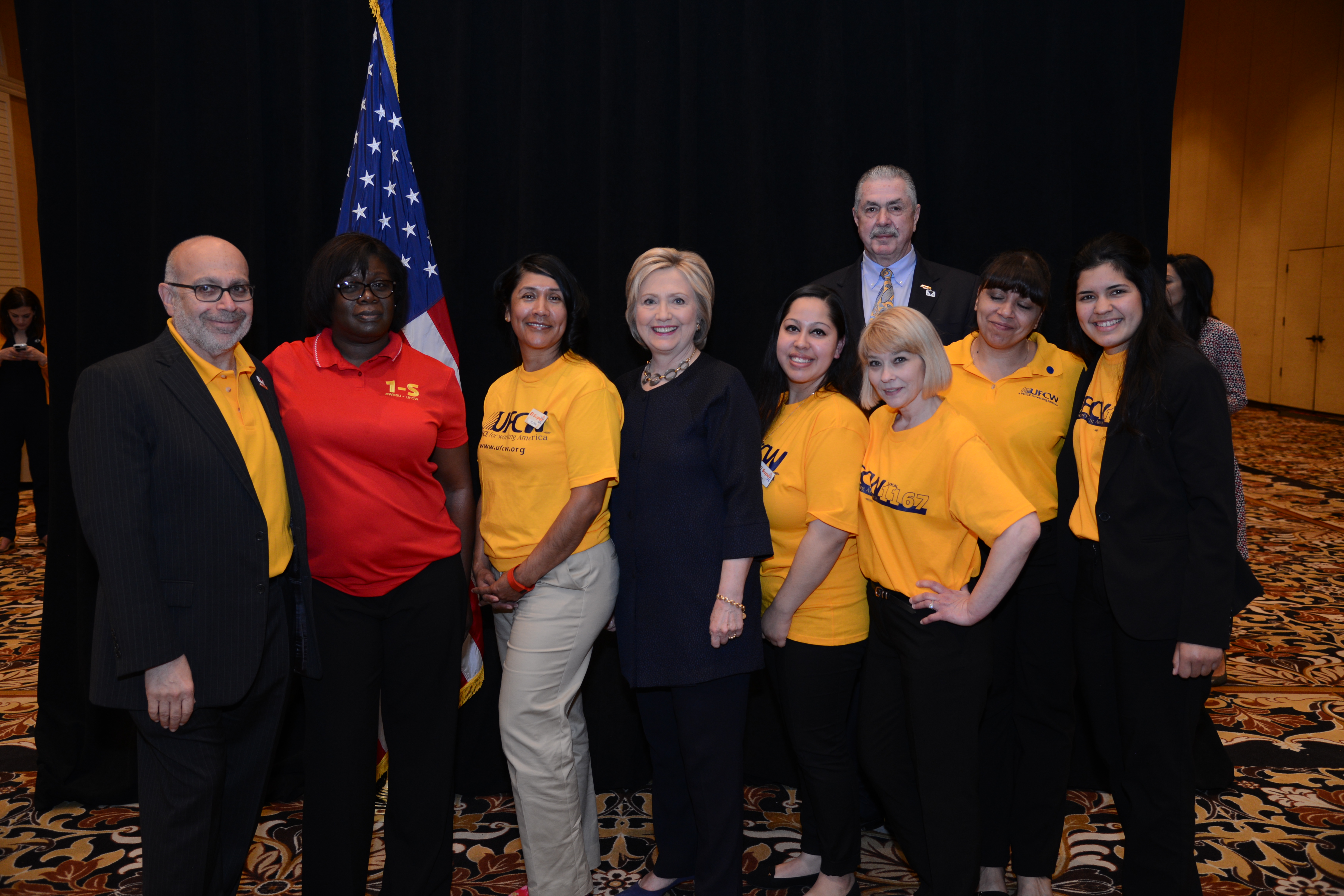 “I’m a working mom and I’m going to school,” said Yolanda Pivaral, a UFCW member and worker at El Super. “Without a predictable work schedule, it’s tough to coordinate child care and manage my classes. Secretary Clinton gets it. Workers in my store want a union contract so we can have the chance to shape our schedules. To have more control over my life would help me do my job better, manage my class work, and build a good life for my son.”
“I’m a working mom and I’m going to school,” said Yolanda Pivaral, a UFCW member and worker at El Super. “Without a predictable work schedule, it’s tough to coordinate child care and manage my classes. Secretary Clinton gets it. Workers in my store want a union contract so we can have the chance to shape our schedules. To have more control over my life would help me do my job better, manage my class work, and build a good life for my son.”
“Buying a wedding dress or a child’s first pair of shoes, these are big events and we work hard to make them special memories for customers,” said Sherry Hamilton, a Macy’s union representative. “I don’t think people realize how much havoc bad scheduling can have upon a worker’s life. By making work schedules in the retail industry more stable and reliable, we would be able to enjoy precious moments in our personal lives as well.”
Clinton also addressed the UFCW conference, and was introduced by International President Marc Perrone.
“Our members endorsed Hillary because she is the only candidate who truly cares about the issues that matter to them. Regardless of what job a person does, Secretary Clinton is committed to making sure that people who work hard get the brighter future they have earned and deserve,” said UFCW International President Marc Perrone. “It speaks to Hillary’s character and her compassion that she doesn’t talk at our members, she listens to them.”
BACKGROUND
In January 2016, after surveying its membership across the country, UFCW endorsed Sec. Clinton. This is the second time Sec. Clinton has personally spoken with retail workers who are part of the UFCW.
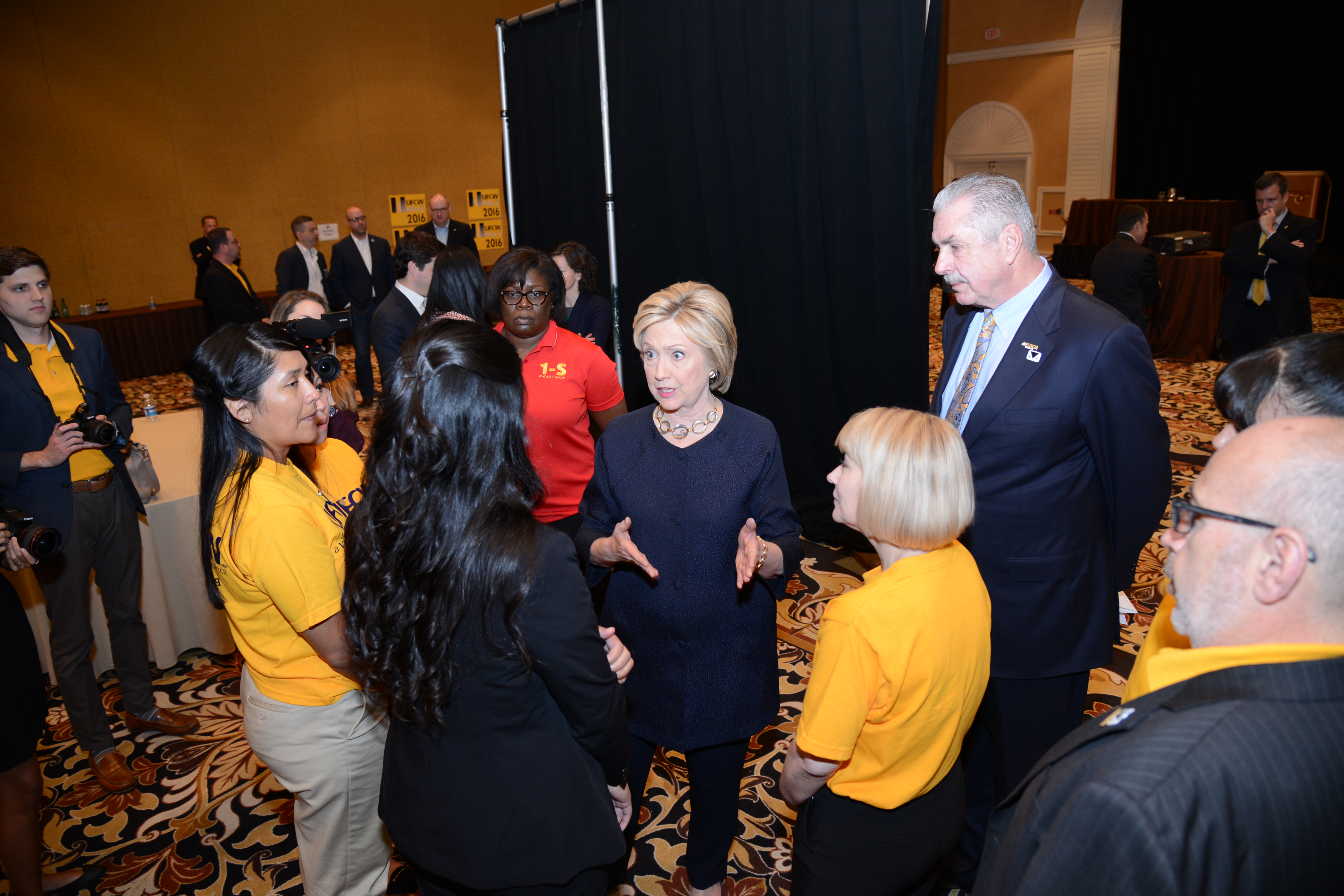 The retail sector is one of the fastest growing parts of the economy, but 40 million retail workers face challenges from erratic schedules, split shifts and part-time hours that make it difficult to live a stable life, manage a second job, or coordinate care for their families. These are common concerns throughout the industry and are a major reason why more and more retail workers are considering the benefits of joining a union. Earlier this year, UFCW announced it already had 100 organizing wins in 100 days, reflecting workers desire to work together to secure their lives and futures.
The retail sector is one of the fastest growing parts of the economy, but 40 million retail workers face challenges from erratic schedules, split shifts and part-time hours that make it difficult to live a stable life, manage a second job, or coordinate care for their families. These are common concerns throughout the industry and are a major reason why more and more retail workers are considering the benefits of joining a union. Earlier this year, UFCW announced it already had 100 organizing wins in 100 days, reflecting workers desire to work together to secure their lives and futures.
BIOS
Yolanda Pivaral is 23, works at El Super Store #13 located in Los Angeles, CA and has been a cashier there for 3.5 years. She is a single mother to a six year old boy. She and her son live in Los Angeles. Yolanda is also furthering her education and is studying Communications at the California State University, Los Angeles. Yolanda has currently been getting more involved in her union. She has become trained and is now helping to do workshops to help make fellow union members US Citizens, through the Union Citizen Action Network.
Flora Castaneda 44, has worked as cashier at El Super Store #17 located in Los Angeles, CA for 12 years as a cashier. She is a single mother of three children. She and her children live in Los Angeles. Flora is a member of the bargaining team. She and her fellow co-workers have been fighting for over two years for adequate paid sick days, better wages, better benefits, more affordable health care, a fair seniority system, and respect.
Sherry Hamilton is 50, and was a sales associate at Macy’s in the Bronx for 17 years. After joining Local 1-S while working at Macy’s, she later joined the Local 1-S team where she now serves other Macy’s employees for the union.
###
UFCW is the largest private sector union in the United States, representing 1.3 million professionals and their families in grocery stores, meatpacking, food processing, retail shops and other industries. Our members help put food on our nation’s tables and serve customers in all 50 states, Canada and Puerto Rico.
Learn more about the UFCW at www.ufcw.org.
May 24, 2016
UFCW Stop & Shop Members Thank Customers for Support
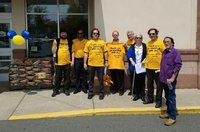 Last week, dozens of Stop & Shop union members, staff, and community members from New England UFCW locals went out to Stop & Shop stores as part of a Customer Appreciation Day to celebrate the customers whose support helped win a strong union contract for over 35,000 Stop & Shop union members throughout New England and the over 1,500 members in western Massachusetts.
Last week, dozens of Stop & Shop union members, staff, and community members from New England UFCW locals went out to Stop & Shop stores as part of a Customer Appreciation Day to celebrate the customers whose support helped win a strong union contract for over 35,000 Stop & Shop union members throughout New England and the over 1,500 members in western Massachusetts.
Stop & Shop union members worked without a contract for over two months. During this period, thousands of customers signed petitions in support of a fair contract, made countless calls to the company asking them to offer a fair deal to hard working union members, and made their opinions known in the stores in favor of a good contract.
With their support, our bargaining committee was able to negotiate collectively for:
• 480 New Full-Time Jobs
• Fair & Predictable Scheduling so that we can spend time with our families and provide for our families
• Fair Pay and a path to $15 for all full-time employees
• Affordable Healthcare for our families
Matt Szulborski, Organizing Director of UFCW Local 1459 said, in gratitude to customers, “Working families coming together on the job and in the community helped win a better life for Stop & Shop union members. Thank you for all your support and help. I believe with a voice at work and communities coming together, all working people can gain a better life.”
May 19, 2016
Members of Congress Join UFCW to Stamp Out Hunger
[aesop_image imgwidth=”40%” img=”http://demo.dev.ufcw.org/files/2016/05/Stamp-Out-Hunger.jpg” align=”right” lightbox=”on” captionposition=”left”]
Last week, members of Congress from across the country, together with members of the UFCW, joined together to help launch the National Association of Letter Carriers’ “Stamp Out Hunger” food drive.
“Stamp Out Hunger,” the largest single-day food drive, invited Americans to leave food by their mailboxes on Saturday, May 14 for collection by their neighborhood letter carriers for delivery to local food pantries.
This year, the UFCW, as a national title sponsor, invited Congressional offices and members from both sides of the aisle to participate. Sen. Jeff Merkley (D-Ore.), Sen. Sherrod Brown (D-Ohio), Rep. Jan Schakowsky (D-Ill.), Rep. G.K. Butterfield (D-N.C.), Rep. Bobby Scott (D-Va.), Rep. Alma Adams (D-N.C.), and Rep. Marcia Fudge (D-Ohio) and their staff participated in helping us to promote this worthy cause.
UFCW Locals from all across the country also hosted their own events, making this year’s food drive one of the biggest and best that anyone had ever seen.
UFCW members see the effects of hunger in America every single day. Every time someone has to turn back and put something away in one of our checkout lines because they don’t have enough money, we feel for them. For millions of families, this year’s food drive was a small, but important, step towards fixing that problem.
[aesop_image imgwidth=”content” img=”http://demo.dev.ufcw.org/files/2016/05/Stamp-Out-Hunger2.jpg” align=”center” lightbox=”on” captionposition=”left”]
May 4, 2016
Viscofan Workers Launch Petition; Call for Safe Jobs
[aesop_image imgwidth=”30%” img=”http://www.ufcw.org/wp-content/blogs.dir/56/files/2016/04/DSC_0516.jpg” align=”left” lightbox=”on” captionposition=”left”]
The workers at the Viscofan plant in Danville, Illinois, deserve safe jobs, they say in a newly launched petition to The Viscofan Group Chairman Jose Domingo de Ampuero y Osma. The workers, who are members of UFCW Local 686, and their families shouldn’t have to worry whether their loved ones will come home in one piece when they return from work each day.
After a successful year, Viscofan has seen positive growth, which is centered on the work done by these members and others in North America. But as company sales and profits increase, the workers say they are being hurt by the plant. The Danville plant had 18 violations of U.S. health and safety law in the last seven years, yet Viscofan has refused union proposals to improve the safety of their workplace.
These Local 686 members are now asking supporters to sign their petition that says the company’s success shouldn’t come at the expense of the health and safety of its workers. The Viscofan plant is an integral part of the Danville community and its workers count on the good, safe, family-supporting jobs it provides. They are asking the company to send its negotiators back to the table with an edict to make the plant safer, the community stronger, and share in the success. Click here to sign the petition.
March 24, 2016
National Food Union & Food Companies Announce Major Donation to Help Feed Flint Families in Crisis
UFCW partners with Cargill, ConAgra Foods, Hormel Foods, JBS USA, Pinnacle Foods, Downs Food Group, Ryder Logistics for multi-ton donation of high-quality, high-protein food
FLINT, MICH. – In an effort to help Flint families dealing with an unprecedented water and economic crisis, the nation’s largest union for food workers, the United Food and Commercial Workers International Union (UFCW), has teamed up with some of America’s largest food manufacturers for a massive multi-ton donation of high-quality food to the Food Bank of Eastern Michigan in Flint, Michigan.
As part of this effort, some of America’s best-known food manufacturers and longtime UFCW partners, including Cargill, ConAgra Foods, Hormel Foods, JBS USA, Pinnacle Foods, Downs Food Group and Ryder Logistics have joined forces to bring relief to Flint families in need. Together they’ve donated more than 60 tons of beef, pork, poultry, canned meats, ready-to-eat soups and pastas, and peanut butter.
“The crisis imposed on Flint families is a historic failure. To do what is right for these good people we must act, and we must act together,” UFCW 876 President Roger Robinson said. “Today, UFCW and its employer partners have come together for this community, demonstrating our ability to unite in advocacy for the protections all families deserve; to be the voice of the worker that is too often ignored; and to provide the strength and support to navigate all workers to a better life.”
“We firmly believe that everyone has the right to enjoy safe and nutritious food,” said Jarrod Gillig, general manager of Cargill’s beef processing plant in Schuyler that is producing the beef for Cargill’s donation. “We know that protein, like ground beef, provides an array of essential nutrients to children and adults, and we believe it is important for us to provide some relief for a community in need of long-term support.”
“Our donation provides a variety of quality, protein-rich products for the people of Flint,” said Thomas L. Nuss, director of human resource operations at Hormel Foods. “We are proud to partner with the UFCW in this endeavor, and hope our effort will help those in need.”
“At JBS, we’re committed to giving back to the communities in which we live and work, and to helping when our neighbors are in need,” said Chris Gaddis, head of JBS USA human resources. “Families in Flint are experiencing extremely difficult times, and if we can help, we’re honored to offer our support to those families.”
Leading this effort to help feed Flint families in need are UFCW locals across the country, specifically members of UFCW Locals 38, (Milton, Pa.), 293 (Fremont, Neb.), 540 (Grapevine, Tex.), 617 (Fort Madison, Iowa), 1149 (Marshalltown, Iowa), 1161 (Worthington, Minn.) 1996 (Suwanee, Ga.), who have made or contributed food or transportation to this effort.
In addition, UFCW Locals 876 and 951, which represent workers in Flint and across Michigan, have been coordinating the UFCW’s ongoing efforts to serve their Flint members, their families and the broader Eastern Michigan community.
“We are committed to helping not only our members, but the entire community effected by the Flint water crisis,” John Cakmakci, UFCW 951 president, said. “To date, we have raised over $100,000 to provide quality food and water to Flint residents. Next week, we will be hosting the first of many food and water give-aways for the nearly 500 UFCW 951 members and retirees living through this horrible situation.”
Additionally, Local 876 has contributed more than $14,000 as part of their on-going local relief efforts.
“Good, nutritious food is key to the Flint community’s recovery, and we can’t thank this incredible team enough for what they have done for Flint families and children” said Kara Ross, Vice President of the Food Bank of Eastern Michigan.
Background Statistics:
More than 125,000 pounds of food from eight companies in eight states and nine UFCW locals
Products included are: Fresh beef, ground beef, pork, poultry, peanut butter, canned chicken, Chef Boyardee, Hormel chili, Dinty Moore Compleats beef stew, Peter Pan peanut butter, Skippy peanut butter singles, and Vienna Sausages
March 22, 2016
Local 1428 Hosts First ‘Labor United Against Cancer’ Event
On March 9, UFCW Local 1428, in partnership with the American Cancer Society, hosted the first annual Labor United Against Cancer Run/Walk and Wellness Fair in San Dimas, California. Over 175 people attended the event to stand united in the fight against cancer, including members of the community, and labor and elected officials. In addition to Local 1428, members of UNAC, USW, Teamsters 396, Teamsters 630, Laborers 300, HERE 11, IUPAT DC36, Firefighters Local 1014, and SEIU 2015 were there to support a worthy cause.
Over $15,000 was raised from the event and donated to the American Cancer Society, and members of Local 1428 will continue to support the American Cancer Society with the end goal of finding a cure for this horrible and devastating disease.
“When labor unites, labor wins and with this event we are showing that labor is united in the fight to defeat cancer,” said UFCW Local 1428 President Mark Ramos.
March 1, 2016
Local 400 Member “Adopts” Entire Classroom
[aesop_quote type=”pull” background=”#282828″ text=”#ffffff” width=”30%” align=”right” size=”2″ quote=”It’s great being a Local 400 member. It helps me on the job having my union standing behind me. And that enables me—and many of my Local 400 brothers and sisters—to do what we can for our community.” cite=”William Iveym, UFCW Local 400″ parallax=”on” direction=”left”]
The following was originally posted by Local 400:

For ten years, William Ivey’s organization has provided every second grader at Capron Elementary School with a backpack filled with school supplies.
When William Ivey says, “We try to give back to the community,” he’s not kidding. A UFCW Local 400 member working as a sanitation specialist at Boar’s Head in Jarratt, Va., for the past 12 years, Billy goes far above and beyond the call of duty to support not only his Local 400 brothers and sisters, but his neighbors, too.
Together with his Local 400 colleagues Emerson Tennessee and Andrew Blunt, his brother Leon and other friends, Billy founded the Community Fellowship of Men, an organization that has “adopted” the second grade class at Capron Elementary School in Capron, Va., as their own. The Community Fellowship hosts an annual cookout every October, which raises funds to provide every second grader with a backpack filled with school supplies. The 2015 cookout marked the 10th year of this great event, which includes inflatable bounce houses for the children, and a car show for the adults.
“We provide the sausages and the meats and we man the grills,” Billy said. “It’s a real family gathering. People look forward to it every year. And the children love their backpacks.”
[aesop_quote type=”block” background=”#084e93″ text=”#ffffff” width=”content” align=”center” size=”2″ quote=”It’s a real family gathering. People look forward to it every year. And the children love their backpacks.” parallax=”on” direction=”left”]
Community Fellowship members support the students in other ways, too, volunteering in the school, passing out healthy snacks, and helping with athletic contests, for example.
And it’s not just children who benefit. The Community Fellowship assists widows in Southampton County, with members mowing the grass when it’s hot outside and helping out around the house as needed.
Billy’s community spirit is also seen in his involvement with his church, Pleasant Plains Baptist, located in his hometown of Drewryville, Va. Billy is a member of the church’s Ministry of Comfort and serves on the Usher Board. “The church is very important to me,” Billy said. “It helps me be a better person.”
Billy’s exemplary leadership and activism reflect the values of his union. “It’s great being a Local 400 member,” he said. “It helps me on the job having my union standing behind me. And that enables me—and many of my Local 400 brothers and sisters—to do what we can for our community.”
February 29, 2016
Black History Month Member Profile: Hidi Frazier of Local 1996
 As the UFCW continues to honor Black History Month and reinforces its commitment to racial and economic justice, we’re asking members why these issues matter to them. Hidi Frazier of Local 1996 has worked for Kroger in Georgia for 15 years. As a Deli Manager, she oversees both the deli and bakery, trains new associates, takes inventory, and makes orders.
As the UFCW continues to honor Black History Month and reinforces its commitment to racial and economic justice, we’re asking members why these issues matter to them. Hidi Frazier of Local 1996 has worked for Kroger in Georgia for 15 years. As a Deli Manager, she oversees both the deli and bakery, trains new associates, takes inventory, and makes orders.
[aesop_quote type=”pull” background=”#282828″ text=”#ffffff” width=”30%” align=”right” size=”2″ quote=”A lot of issues affects us all in one way or another. We all want fair wages, good health benefits and good pensions. We all have to continue to stand together and keep working families strong.” cite=”Hidi Frazier, UFCW Local 1996″ parallax=”on” direction=”left”]
Hidi says that to her, “Black History Month … is about honoring and remembering those who made a difference and paved the way for people like me. Without their sacrifice and determination to want and fight for change, I wouldn’t be where I am today.”
Hidi first became active in her union seven years ago when a fellow member asked if she’d like to volunteer with phone banking to ask fellow members to vote and help get labor-friendly candidates elected in her state who will make a difference for working families. She agreed, and has been an active member ever since.
During her time volunteering, Hidi was inspired by Mary Lou Romaine-Waymer, who leads and organizes the phone banks and other political activities for the local: “She does a great job. Mary Lou Wagner is a leader for UFCW. She keeps the members well informed in local and state politics. Mary Lou reminds us that these races are the most important because they affect our everyday lives as citizens of Georgia.”
After seeing first-hand just how much of a difference being part of union family makes in her life, Hidi wants to spread the word. As a manager, she’s in a unique position to help explain to her fellow coworkers what the union is all about. “I would advise everyone, not just African Americans, to become involved. A lot of issues affects us all in one way or another. We all want fair wages, good health benefits and good pensions. We all have to continue to stand together and keep working families strong,” she says
[aesop_quote type=”pull” background=”#282828″ text=”#ffffff” width=”30%” align=”left” size=”2″ quote=”When union members, community members, and other working people come together, we are more powerful.” parallax=”on” direction=”left”]
Hidi also stresses the importance of solidarity. “We have the AFL-CIO, where all the unions come together to keep the fight going for working families,” she says. “When union members, community members, and other working people come together, we are more powerful. Labor and civil rights intersect by continuing the fight on issues that affect working families. We will continue to rally and lobby together to make sure that we all have the same opportunities as everyone else. We have to have more training and workshops so that minorities can compete in the workplace. Lastly, we have to make our unions stronger than ever.”
February 24, 2016
Black History Month Member Profile: David Montgomery of Local 655
As the UFCW continues to honor Black History Month and reinforces its commitment to racial and economic justice, we’re asking members why these issues matter to them. David Montgomery has been with UFCW Local 655 in St. Louis, Missouri for 15 years. David spends his days as the floral warehouse supervisor, coordinating various arrangements to be delivered to Schnucks grocery stores around the city.
[aesop_quote type=”pull” background=”#282828″ text=”#ffffff” width=”30%” align=”right” size=”2″ quote=”My father was always a big union guy and he always told me that it was good to help yourself, but it is great to be able to help others.” cite=”David Montgomery, UFCW Local 655″ parallax=”on” direction=”left”]
David says the value of Black History Month lies in its ability to continue to educate the average American, even himself.
“It’s a time of year to celebrate and acknowledge the wonderful achievements and advancements that have been introduced to most of the world by Black people that many don’t even know about. I still learn something new every February,” David said.
David’s family has union roots, which is what first got David interested not only in a union job, but the labor movement as a whole.
“My father was always a big union guy and he always told me that it was good to help yourself, but it is great to be able to help others,” he said. “I started last year getting really involved, especially in the Fight for 15 rallies. I’ve seen how people from all over can come together for a great purpose.”
For other black workers interested in the labor movement, David has a simple piece of advice.
“Just do it. Just know you are continuing the same fight as legendary leaders that have come before us and you’re helping lay a stronger foundation for generations to come,” he said. “It’s a feeling you can’t put into words.”
David believes that civil rights and labor go hand-in-hand, because without strong union support, workers are open to having their rights violated. The 33-year-old father of three says labor can build lasting positive change in race relations by “building an inclusive and diverse workforce.”
“Labor and civil rights intersect all over the place,” he said.
February 23, 2016
Black History Month Spotlight: An Interview with Robin Williams, UFCW International Vice-President
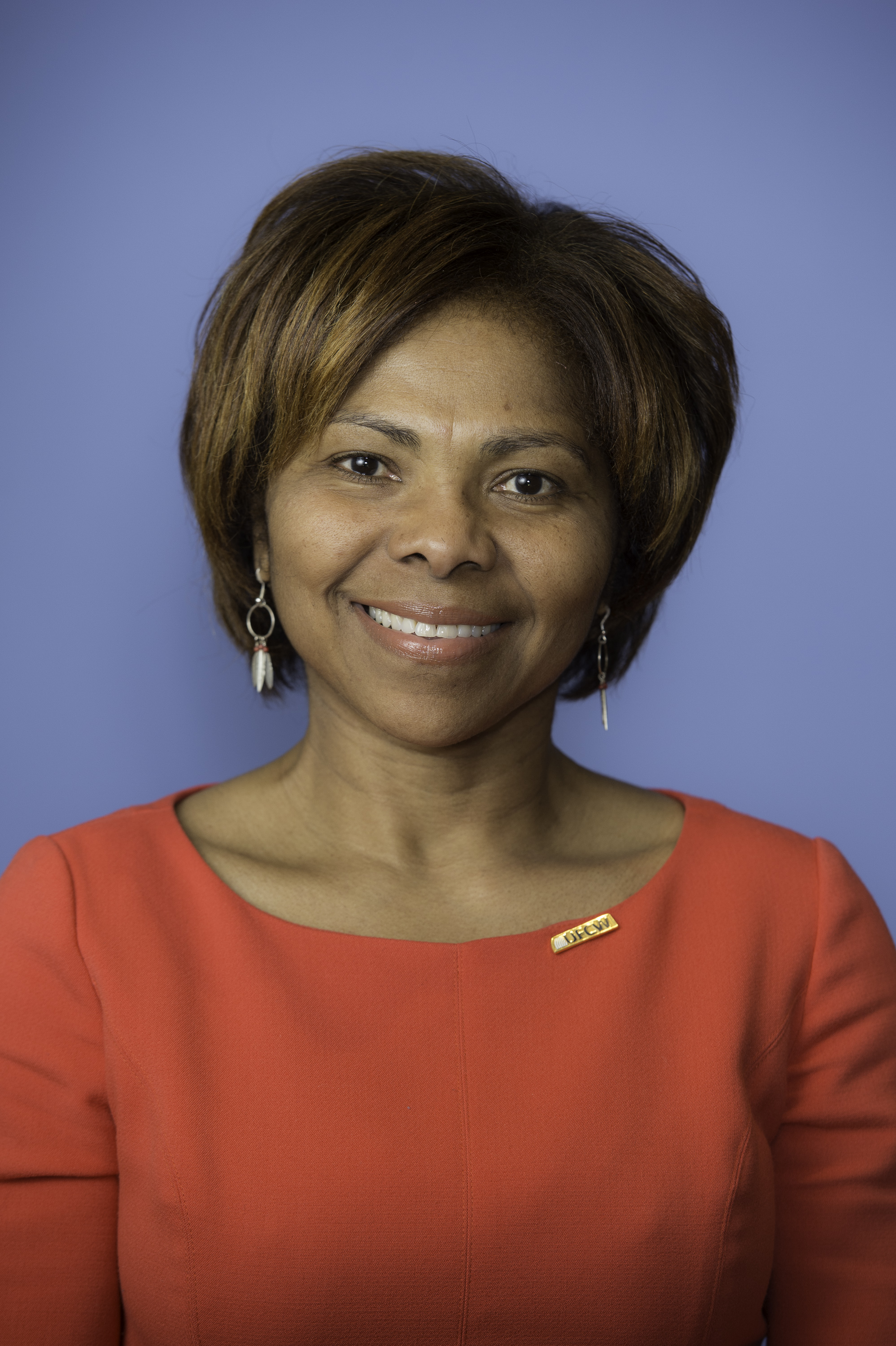 As part of our ongoing celebration of Black History Month, we sat down with UFCW International Vice President and Director of the Civil Rights and Community Action Department Robin Williams to talk about the important relationship of the labor movement and the achievements and contributions made by African Americans.
As part of our ongoing celebration of Black History Month, we sat down with UFCW International Vice President and Director of the Civil Rights and Community Action Department Robin Williams to talk about the important relationship of the labor movement and the achievements and contributions made by African Americans.
What does Black History Month mean to you and why is it so important?
Black History Month is about celebrating and being proud of being Black in America. It is a time where we celebrate the contributions that African Americans, past and present, have made in our society. Our country’s rich history has been deeply impacted by so many groups and it’s important we celebrate everyone’s contributions in order to create a tradition of acknowledgement, inclusion and community engagement. By remembering and celebrating our history, we can build awareness on the struggles and challenges that African Americans have faced and inspire a new generation of civil rights and social justice leaders.
How and why did you become involved with the labor movement?
I was born in 1964 in Washington, D.C. and the labor movement, like the civil rights movement, has been a huge part of my family’s history. My father was a minister and supporter of Dr. King and the Southern Christian Leadership Conference. During the 1970’s, he worked for Raleigh’s Clothing Store and Woodward & Lothrop Department Store, which were both represented by The Retail Clerks Local 400, which later became UFCW Local 400. I remember my dad talking about the union organizing campaign and how solidarity and joining the union was so important for the advancement of Black people. It was because of his union job that my father was able to purchase a home and raise his family in a middle class neighborhood in Washington, D.C.
The 1970s in Washington, D.C. was a time where African Americans were gaining more opportunities to land full-time jobs in local and federal government, as well as in healthcare and other public and private sector jobs. With the increase of union organizing in these sectors, worker solidarity and union membership had quickly become the greatest pathway to the middle class for African American workers.
By the time I was hired as a part-time food clerk for Georgetown Safeway Food Store in Washington, D.C. in the early 1980s, the labor movement was a part of me. I got involved in my union, UFCW Local 400, after organizing a delegation of part-time employees to meet with store management in a demand for fair scheduling. I went on to become an assistant shop steward and then I joined Local 400 as a full-time organizer and led the healthcare team in organizing hundreds of healthcare workers in Southern Maryland and Virginia. I joined the UFCW International staff as Associate Director of Civil Rights and Community Action in 2005.
What suggestions do you have for other African Americans who want to become more involved in the labor movement?
I am grounded in my faith, my family, and in my union. My faith teaches me that the most important thing in life is love. My family keeps me connected to who I am and my culture and my union allows me to be in solidarity with mankind and to serve others.
I am proud to be union–UFCW Union! I am proud to be an advocate for workers’ rights. Unions need more active African American union members, organizers, leaders and advocates to get involved in the labor movement. The labor movement remains one of the greatest avenues for economic freedom for African Americans. If you have passion to fight for justice, if you want to work to create a more equitable society–the labor movement could be the place for you.
There are many ways to get involved. If you are a union member, you can start by attending membership meetings and learning more about the activities of your union. You can also volunteer for union organizing campaigns, workplace actions, social media campaigns, participate in Get Out the Vote campaigns, run for union shop steward or run to serve on your contract bargaining team.
If you are not a member of a union, you can get involved in the labor movement by joining a living wage, fair scheduling, sick leave, or other social and economic justice campaigns–apply for intern opportunities, seek out job opportunities. African Americans that desire to get involved in the labor movement can also seek out volunteer, internships and job opportunities with organizations that are in partnership with labor and civil rights organizations, voter engagement, community organizing, LGBTQ organizations, immigration and workers’ right organizations.
In the 60s, activists like Dr. Martin Luther King Jr., Rosa Parks, Bayard Rustin, and Malcolm X led the Civil Rights movement, which also advocated for expanded workers’ rights. In your opinion, what groups or leaders stand out as being at forefront in the fight for equality and justice now?
Leaders like Reverend William Barber, President of the North Carolina NAACP and founder of the “Forward Together Movement,” the Advancement Project, DEMOS, and many African American labor activists, like myself, are now at the forefront in the fight for equality and justice. Through the Labor Commission on Race and Economic Justice, UFCW International President Marc Perrone and Fred Redmon, Vice President of the United Steelworkers, are at the forefront in leading the conversation and work to dismantle racism within the labor movement.
Also, in today’s era of social media, movements like Color of Change, Not One More Deportation, Black Lives Matter, Black Youth Project 100, and the Dream Defenders have sparked a new generation of advocates for racial and social equality. Many of these young leaders are also leading in the labor movement. Alicia Garza, co-founder of Black Lives Matter is Special Projects Director for the National Domestic Workers Alliance, Carmen Berkley, cofounder of Black Youth Project 100, is Human, Civil and Women’s Rights Director for the AFL-CIO, and Greg Cendana is a young, openly gay Asian American activist and Executive Director of the Asian Pacific American Labor Alliance.
Through their civil rights, community and union activity, these millennials are leading the charge to expose and dismantle a racist system that disenfranchises communities of color.
The labor movement has a rich tradition of fighting inequities that extend beyond the workplace. In what way do labor and civil rights intersect and how can unions help narrow the income and equality divide that disproportionately affect African Americans and other minorities?
In a speech entitled “if the Negro Wins, Labor Wins,” Dr. Martin Luther King, Jr. said:
Negroes in the United States read this history of labor and find it mirrors their own experience. We are confronted by powerful forces telling us to rely on the good will and understanding of those who profit by exploiting us…. They are shocked that action organizations, sit-ins, civil disobedience, and protests are becoming our everyday tools, just as strikes, demonstrations and union organization became yours to insure that bargaining power genuinely existed on both sides of the table… Our needs are identical with labor’s needs: decent wages, fair working conditions, livable housing, old age security, and health and welfare measures… That is why Negroes support labor’s demands and fight laws which curb labor. That is why the labor-hater and labor-baiter is virtually always a twin-headed creature spewing anti-Negro epithets from one mouth and anti-labor propaganda from the other mouth.
These words stand true even today: the success of the civil rights movement as well as the labor movement is the ability to work together in order to move a vigorous agenda that addresses institutional and generational racism, worker exploitation, and social and economic inequality.
Just as Black Lives Matter and today’s Black Liberation movement share agendas that include workers’ rights and union protections, the labor movement must adopt and move a robust civil rights agenda that includes the voices of Black, Latino, Women, Asian, and LGBTQ workers. It must be an agenda that moves campaigns to declare that all workers can earn a better wage, regardless of the level of their education. All workers have a right to paid sick leave and paid family leave. An agenda that works to protect all workers against discrimination based on the color of their skin, their nationality, their self-identity or sexual orientation, or past incarceration or criminal record. Labor should move an agenda that promotes equal pay for all workers regardless of gender, their place of employment or past criminal record. Labor should move an agenda that works with the civil rights movement to protect the right to vote for all people.
The work of the Labor Commission on Race and Economic Justice is only the beginning of a process to address discrimination. Labor can no longer be silent about the attacks on Black communities. Labor must become true allies of the civil rights movement. For the enemies of the labor movement are the same enemies of the civil rights movement, and neither movement can win without the other…
With cases like Friedrichs v. California Teachers Association and expansion of Right to Work, labor cannot withstand the attacks on the movement without joining a greater movement for social and economic justice. The two movements must show up for each other, “For in the End, we will not remember the words of our enemies, but the silence of our friends”…words of Dr. Martin King, Jr.

